Deck 2: The Electric Field II: Continuous Charge Distributions
Question
Question
Question
Question
Question
Question
Question
Question
Question
Question
Question
Question
Question
Question
Question
Question
Question
Question
Question
Question
Question
Question
Question
Question
Question
Question
Question
Question
Question
Question
Question
Question
Question
Question
Question
Question
Question
Question
Question
Question
Question
Question
Question
Question
Question
Question
Question
Question
Question
Question
Question
Question
Question
Question
Question
Question
Question
Question
Question
Question
Question
Question
Question
Question
Question
Question
Question
Question
Question
Question
Question
Question
Question
Question
Question

Unlock Deck
Sign up to unlock the cards in this deck!
Unlock Deck
Unlock Deck
1/75
Play
Full screen (f)
Deck 2: The Electric Field II: Continuous Charge Distributions
1
A disk of radius 10 cm carries a uniform surface charge density of 6.0 µC/m2. The electric field on the axis of the disk at a distance of 5.0 m is approximately
A) 0.34 MN/C
B) 68 kN/C
C) 99 kN/C
D) 0.54 MN/C
E) 18 kN/C
A) 0.34 MN/C
B) 68 kN/C
C) 99 kN/C
D) 0.54 MN/C
E) 18 kN/C
68 kN/C
2
A uniform line charge of linear charge density = 10.0 nC/m extends from x = 5 m to
X = 8 m. The magnitude of the electric field at x = 10 m is
A) 27.0 N/C
B) 9.62 N/C
C) 15.3 N/C
D) 18.8 N/C
E) 37.5 N/C
X = 8 m. The magnitude of the electric field at x = 10 m is
A) 27.0 N/C
B) 9.62 N/C
C) 15.3 N/C
D) 18.8 N/C
E) 37.5 N/C
27.0 N/C
3
A uniform line charge of linear charge density = 5.00 nC/m extends from x = 0 to
X = 10 m. The magnitude of the electric field at x = 12 m is
A) 3.86 N/C
B) 9.62 N/C
C) 15.3 N/C
D) 18.8 N/C
E) 37.5 N/C
X = 10 m. The magnitude of the electric field at x = 12 m is
A) 3.86 N/C
B) 9.62 N/C
C) 15.3 N/C
D) 18.8 N/C
E) 37.5 N/C
18.8 N/C
4
A uniform circular ring has charge Q and radius r. A uniformly charged disk also has charge Q and radius r. Calculate the electric field at a distance of r along the axis of the ring divided by the electric field at a distance of r along the axis of the disk.
A) 1.0
B) 0.60
C) 1.7
D) 0.50
E) 0.85
A) 1.0
B) 0.60
C) 1.7
D) 0.50
E) 0.85

Unlock Deck
Unlock for access to all 75 flashcards in this deck.
Unlock Deck
k this deck
5
A uniform line charge of linear charge density = 10.0 nC/m extends from x = 5 m to
X = 8 m. The magnitude of the electric field at the point y = 5 m on the perpendicular bisector of the finite line of charge is
A) 3.86 N/C
B) 5.79 N/C
C) 8.31 N/C
D) 10.3 N/C
E) 12.6 N/C
X = 8 m. The magnitude of the electric field at the point y = 5 m on the perpendicular bisector of the finite line of charge is
A) 3.86 N/C
B) 5.79 N/C
C) 8.31 N/C
D) 10.3 N/C
E) 12.6 N/C

Unlock Deck
Unlock for access to all 75 flashcards in this deck.
Unlock Deck
k this deck
6
Use the following to answer the problem:
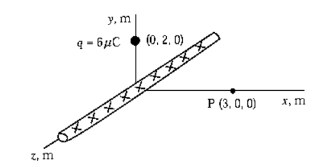
-An infinite line charge of linear density = 0.30 µC/m lies along the z axis and a point charge q = 6.0 µC lies on the y axis at y = 2.0 m. The electric field at the point P on the x axis at x = 3.0 m is approximately
A) (4.2 kN/C)
B) (4.2 kN/C) + (0.64 kN/C)
+ (0.64 kN/C) 
C) (-0.96 kN/C)
D) (2.8 kN/C) + (0.64 kN/C)
+ (0.64 kN/C) 
E) (5.2 kN/C) - (2.3 kN/C)
- (2.3 kN/C) 

-An infinite line charge of linear density = 0.30 µC/m lies along the z axis and a point charge q = 6.0 µC lies on the y axis at y = 2.0 m. The electric field at the point P on the x axis at x = 3.0 m is approximately
A) (4.2 kN/C)

B) (4.2 kN/C)
 + (0.64 kN/C)
+ (0.64 kN/C) 
C) (-0.96 kN/C)

D) (2.8 kN/C)
 + (0.64 kN/C)
+ (0.64 kN/C) 
E) (5.2 kN/C)
 - (2.3 kN/C)
- (2.3 kN/C) 

Unlock Deck
Unlock for access to all 75 flashcards in this deck.
Unlock Deck
k this deck
7
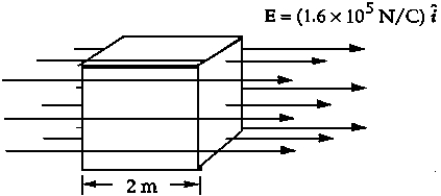 A cubical surface with sides 2.0 m long is oriented with right and left faces perpendicular to a uniform electric field
A cubical surface with sides 2.0 m long is oriented with right and left faces perpendicular to a uniform electric field  of (1.6 *105 N/C)
of (1.6 *105 N/C)  . The net charge enclosed by this surface is approximately
. The net charge enclosed by this surface is approximatelyA) 25 * 105 µC
B) 6.4 *105 µC
C) 13 *105 µC
D) zero
E) 38 * 105 µC

Unlock Deck
Unlock for access to all 75 flashcards in this deck.
Unlock Deck
k this deck
8
Consider a uniform electric field  = (5.0 kN/C)
= (5.0 kN/C)  . What is the flux of this field through a square of side 20 cm in a plane parallel to the yz plane?
. What is the flux of this field through a square of side 20 cm in a plane parallel to the yz plane?
A) 0.10 kN · m2/C
B) 0.20 kN · m2/C
C) 0.40 kN · m2/C
D) 0.50 kN · m2/C
E) 0.13 kN · m2/C
 = (5.0 kN/C)
= (5.0 kN/C)  . What is the flux of this field through a square of side 20 cm in a plane parallel to the yz plane?
. What is the flux of this field through a square of side 20 cm in a plane parallel to the yz plane?A) 0.10 kN · m2/C
B) 0.20 kN · m2/C
C) 0.40 kN · m2/C
D) 0.50 kN · m2/C
E) 0.13 kN · m2/C

Unlock Deck
Unlock for access to all 75 flashcards in this deck.
Unlock Deck
k this deck
9
A disk of radius 10 cm carries a uniform surface charge density of 6.0 µC/m2. The electric field on the axis of the disk at a distance of 0.10 cm is approximately
A) 0.34 MN/C
B) 68 kN/C
C) 99 kN/C
D) 0.54 MN/C
E) 18 kN/C
A) 0.34 MN/C
B) 68 kN/C
C) 99 kN/C
D) 0.54 MN/C
E) 18 kN/C

Unlock Deck
Unlock for access to all 75 flashcards in this deck.
Unlock Deck
k this deck
10
A uniform circular ring has charge Q = 7.36 C, and radius r = 3.33 cm. Calculate the magnitude of the electric field at a distance of 4.20 cm along the axis of the ring.
A) 1.81 * 101 N/C
B) 6.52 N/C
C) 1.44* 107 N/C
D) 1.44 *101 N/C
E) 1.81 * 107 N/C
A) 1.81 * 101 N/C
B) 6.52 N/C
C) 1.44* 107 N/C
D) 1.44 *101 N/C
E) 1.81 * 107 N/C

Unlock Deck
Unlock for access to all 75 flashcards in this deck.
Unlock Deck
k this deck
11
A uniform circular ring has charge Q and radius r. The magnitude of the electric field at a distance of r along the axis of the ring is Eo. If the radius were to double, then calculate the new electric field at a distance of r along the axis of the ring in terms of Eo.
A) 0.40 Eo
B) 0.25 Eo
C) 0.50 Eo
D) 0.20 Eo
E) 0.089 Eo
A) 0.40 Eo
B) 0.25 Eo
C) 0.50 Eo
D) 0.20 Eo
E) 0.089 Eo

Unlock Deck
Unlock for access to all 75 flashcards in this deck.
Unlock Deck
k this deck
12
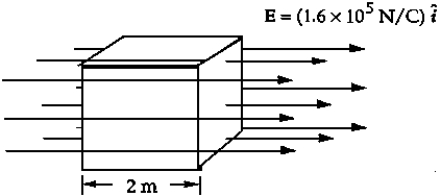 A cubical surface with no charge enclosed and with sides 2.0 m long is oriented with right and left faces perpendicular to a uniform electric field E of (1.6 * 105 N/C)
A cubical surface with no charge enclosed and with sides 2.0 m long is oriented with right and left faces perpendicular to a uniform electric field E of (1.6 * 105 N/C)  . The net electric flux E through this surface is approximately
. The net electric flux E through this surface is approximatelyA) zero
B) 6.4 *105 N · m2/C
C) 13* 105 N · m2/C
D) 25 * 105 N · m2/C
E) 38 *105 N · m2/C

Unlock Deck
Unlock for access to all 75 flashcards in this deck.
Unlock Deck
k this deck
13
A uniform line charge of linear charge density = 5.00 nC/m extends from x = 0 to x = 10 m. The magnitude of the electric field at the point y = 12 m on the perpendicular bisector of the finite line of charge is
A) 18.8 N/C
B) 15.3 N/C
C) 9.65 N/C
D) 4.27 N/C
E) 2.88 N/C
A) 18.8 N/C
B) 15.3 N/C
C) 9.65 N/C
D) 4.27 N/C
E) 2.88 N/C

Unlock Deck
Unlock for access to all 75 flashcards in this deck.
Unlock Deck
k this deck
14
Consider a uniform electric field  = (5.0 kN/C)
= (5.0 kN/C)  . What is the flux of this field through a square of side 20 cm if the normal to its plane makes a 45º angle with the x axis?
. What is the flux of this field through a square of side 20 cm if the normal to its plane makes a 45º angle with the x axis?
A) 71 N · m2/C
B) 0.14 kN · m2/C
C) 0.28 kN · m2/C
D) 0.35 kN · m2/C
E) 0.19 kN · m2/C
 = (5.0 kN/C)
= (5.0 kN/C)  . What is the flux of this field through a square of side 20 cm if the normal to its plane makes a 45º angle with the x axis?
. What is the flux of this field through a square of side 20 cm if the normal to its plane makes a 45º angle with the x axis?A) 71 N · m2/C
B) 0.14 kN · m2/C
C) 0.28 kN · m2/C
D) 0.35 kN · m2/C
E) 0.19 kN · m2/C

Unlock Deck
Unlock for access to all 75 flashcards in this deck.
Unlock Deck
k this deck
15
Use the following to answer the problem:

-An infinite line charge of linear density = 0.30 µC/m lies along the z axis and a point charge q = 6.0 µC lies on the y axis at y = 2.0 m. The x component of the electric field at the point P on the x axis at x = 3.0 m is approximately
A) 1.8 kN/C
B) 4.2 kN/C
C) 0.96 kN/C
D) 5.2 kN/c
E) 0.64 mN/C

-An infinite line charge of linear density = 0.30 µC/m lies along the z axis and a point charge q = 6.0 µC lies on the y axis at y = 2.0 m. The x component of the electric field at the point P on the x axis at x = 3.0 m is approximately
A) 1.8 kN/C
B) 4.2 kN/C
C) 0.96 kN/C
D) 5.2 kN/c
E) 0.64 mN/C

Unlock Deck
Unlock for access to all 75 flashcards in this deck.
Unlock Deck
k this deck
16
Use the following to answer the problem:

-An infinite line charge of linear density = 0.30 µC/m lies along the z axis and a point charge q = 6.0 µC lies on the y axis at y = 2.0 m. The y component of the electric field at the point P on the x axis at x = 3.0 m is approximately
A) 1.8 kN/C
B) 2.3 kN/C
C) 0.96 kN/C
D) 4.2 kN/C
E) 2.8 kN/C

-An infinite line charge of linear density = 0.30 µC/m lies along the z axis and a point charge q = 6.0 µC lies on the y axis at y = 2.0 m. The y component of the electric field at the point P on the x axis at x = 3.0 m is approximately
A) 1.8 kN/C
B) 2.3 kN/C
C) 0.96 kN/C
D) 4.2 kN/C
E) 2.8 kN/C

Unlock Deck
Unlock for access to all 75 flashcards in this deck.
Unlock Deck
k this deck
17
An infinite plane lies in the yz-plane and it has a uniform surface charge density. The electric field at a distance x from the plane
A) decreases linearly with x.
B) decreases as 1/x2.
C) is constant and does not depend on x.
D) increases linearly with x.
E) is undetermined.
A) decreases linearly with x.
B) decreases as 1/x2.
C) is constant and does not depend on x.
D) increases linearly with x.
E) is undetermined.

Unlock Deck
Unlock for access to all 75 flashcards in this deck.
Unlock Deck
k this deck
18
A conducting circular disk has a uniform positive surface charge density. Which of the following diagrams best represents the electric field lines from the disk? (The disk is drawn as a cross-section.) 
A) 1
B) 2
C) 3
D) 4
E) none of the diagrams

A) 1
B) 2
C) 3
D) 4
E) none of the diagrams

Unlock Deck
Unlock for access to all 75 flashcards in this deck.
Unlock Deck
k this deck
19
Which of the following circumstances about Gauss's law is true?
A) Gauss's law is applicable in highly symmetric cases such as uniformly charged infinite plane, infinite cylinder, or sphere.
B) Gauss's law is applicable for a point charge.
C) Gauss's law is applicable for two or more point charges.
D) Gauss's law is applicable for any objects of any shape.
E) all of the above
A) Gauss's law is applicable in highly symmetric cases such as uniformly charged infinite plane, infinite cylinder, or sphere.
B) Gauss's law is applicable for a point charge.
C) Gauss's law is applicable for two or more point charges.
D) Gauss's law is applicable for any objects of any shape.
E) all of the above

Unlock Deck
Unlock for access to all 75 flashcards in this deck.
Unlock Deck
k this deck
20
A disk of radius 10 cm carries a uniform surface charge density of 6.0 µC/m2. The electric field on the axis of the disk at a distance of 10 cm is approximately
A) 0.34 MN/C
B) 68 kN/C
C) 99 kN/C
D) 0.54 MN/C
E) 18 kN/C
A) 0.34 MN/C
B) 68 kN/C
C) 99 kN/C
D) 0.54 MN/C
E) 18 kN/C

Unlock Deck
Unlock for access to all 75 flashcards in this deck.
Unlock Deck
k this deck
21
An electric field is  = (400 N/C)
= (400 N/C)  for x > 0 and
for x > 0 and  = (-400 N/C)
= (-400 N/C)  for x < 0. A cylinder of length 30 cm and radius 10 cm has its center at the origin and its axis along the x axis such that one end is at x = +15 cm and the other is at x = -15 cm. What is the net outward flux through the entire cylindrical surface?
for x < 0. A cylinder of length 30 cm and radius 10 cm has its center at the origin and its axis along the x axis such that one end is at x = +15 cm and the other is at x = -15 cm. What is the net outward flux through the entire cylindrical surface?
A) zero
B) 2.5 kN · m2/C
C) 0.50 kN · m2/C
D) 25 N · m2/C
E) 0.25 MN · m2/C
 = (400 N/C)
= (400 N/C)  for x > 0 and
for x > 0 and  = (-400 N/C)
= (-400 N/C)  for x < 0. A cylinder of length 30 cm and radius 10 cm has its center at the origin and its axis along the x axis such that one end is at x = +15 cm and the other is at x = -15 cm. What is the net outward flux through the entire cylindrical surface?
for x < 0. A cylinder of length 30 cm and radius 10 cm has its center at the origin and its axis along the x axis such that one end is at x = +15 cm and the other is at x = -15 cm. What is the net outward flux through the entire cylindrical surface?A) zero
B) 2.5 kN · m2/C
C) 0.50 kN · m2/C
D) 25 N · m2/C
E) 0.25 MN · m2/C

Unlock Deck
Unlock for access to all 75 flashcards in this deck.
Unlock Deck
k this deck
22
Use the following figure to answer the next problems: 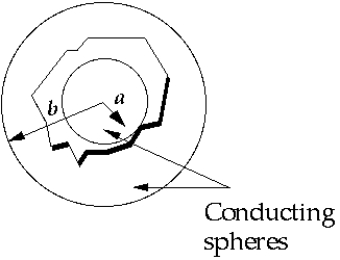
-A solid sphere of radius a is concentric with a hollow sphere of radius b, where b > a. If the solid sphere has a charge +Q and the hollow sphere a charge of -Q, the electric field at radius r, where a < r < b, is which of the following, in terms of k = (4 0)-1?
A) kQ/r2
B) 2kQ/r2
C) kQ/a2
D) kQ/b2
E) kQ/(b - a)2

-A solid sphere of radius a is concentric with a hollow sphere of radius b, where b > a. If the solid sphere has a charge +Q and the hollow sphere a charge of -Q, the electric field at radius r, where a < r < b, is which of the following, in terms of k = (4 0)-1?
A) kQ/r2
B) 2kQ/r2
C) kQ/a2
D) kQ/b2
E) kQ/(b - a)2

Unlock Deck
Unlock for access to all 75 flashcards in this deck.
Unlock Deck
k this deck
23
Use the following figure to answer the next problems: 
-A solid sphere of radius a is concentric with a hollow sphere of radius b, where b > a. If the solid sphere has a charge +Q and the hollow sphere a charge of -Q, the electric field at radius r, where r < a, is which of the following, in terms of k = (4 0)-1?
A) kQ/r2
B) kQr/a3
C) kQ/a2
D) kQ/b2
E) zero

-A solid sphere of radius a is concentric with a hollow sphere of radius b, where b > a. If the solid sphere has a charge +Q and the hollow sphere a charge of -Q, the electric field at radius r, where r < a, is which of the following, in terms of k = (4 0)-1?
A) kQ/r2
B) kQr/a3
C) kQ/a2
D) kQ/b2
E) zero

Unlock Deck
Unlock for access to all 75 flashcards in this deck.
Unlock Deck
k this deck
24
A hollow spherical shell of radius 5.36 cm has a charge of 1.91 C placed at its center. Calculate the electric flux through an area of 1.20*10-2 m2 on the shell.
A) 6.48 *105 N.m2/C
B) 2.16 * 105 N.m2/C
C) 7.20* 104 N.m2/C
D) 2.16 * 101 N.m2/C
E) none of the above
A) 6.48 *105 N.m2/C
B) 2.16 * 105 N.m2/C
C) 7.20* 104 N.m2/C
D) 2.16 * 101 N.m2/C
E) none of the above

Unlock Deck
Unlock for access to all 75 flashcards in this deck.
Unlock Deck
k this deck
25
A sphere of radius 8.0 cm carries a uniform volume charge density = 500 nC/m3. What is the electric field at r = 3.0 cm?
A) 36.0 N/C
B) 230 N/C
C) 140 N/C
D) 565 N/C
E) 450 N/C
A) 36.0 N/C
B) 230 N/C
C) 140 N/C
D) 565 N/C
E) 450 N/C

Unlock Deck
Unlock for access to all 75 flashcards in this deck.
Unlock Deck
k this deck
26
A cube of side 3.56 cm has a charge of 9.11 C placed at its center. Calculate the electric flux through one side of the cube.
A) 1.03*106 N.m2/C
B) 2.58 *105 N.m2/C
C) 8.13 * 108 N.m2/C
D) 1.72 * 105 N.m2/C
E) 1.35 * 108 N.m2/C
A) 1.03*106 N.m2/C
B) 2.58 *105 N.m2/C
C) 8.13 * 108 N.m2/C
D) 1.72 * 105 N.m2/C
E) 1.35 * 108 N.m2/C

Unlock Deck
Unlock for access to all 75 flashcards in this deck.
Unlock Deck
k this deck
27
Use the following figure to answer the next problems: 
-A solid sphere of radius a is concentric with a hollow sphere of radius b, where b > a. If the solid sphere has a charge +Q and the hollow sphere a charge of -Q, the electric field at radius r, where r > b, is which of the following, in terms of k = (4 0)-1?
A) kQ/r2
B) 2kQ/r2
C) kQ/a2
D) kQ/b2
E) zero

-A solid sphere of radius a is concentric with a hollow sphere of radius b, where b > a. If the solid sphere has a charge +Q and the hollow sphere a charge of -Q, the electric field at radius r, where r > b, is which of the following, in terms of k = (4 0)-1?
A) kQ/r2
B) 2kQ/r2
C) kQ/a2
D) kQ/b2
E) zero

Unlock Deck
Unlock for access to all 75 flashcards in this deck.
Unlock Deck
k this deck
28
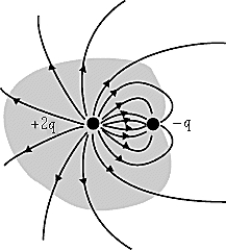 The figure shows a surface enclosing the charges 2q and -q. The net flux through the surface surrounding the two charges is
The figure shows a surface enclosing the charges 2q and -q. The net flux through the surface surrounding the two charges isA) q/ 0
B) 2q/F 0
C) -q/ 0
D) zero
E) None of these is correct.

Unlock Deck
Unlock for access to all 75 flashcards in this deck.
Unlock Deck
k this deck
29
An electric field is  = (400 N/C)
= (400 N/C)  for x > 0 and
for x > 0 and  = (-400 N/C)
= (-400 N/C)  for x < 0. A cylinder of length 30 cm and radius 10 cm has its center at the origin and its axis along the x axis such that one end is at x = +15 cm and the other is at x = -15 cm. What is the net charge inside the cylinder?
for x < 0. A cylinder of length 30 cm and radius 10 cm has its center at the origin and its axis along the x axis such that one end is at x = +15 cm and the other is at x = -15 cm. What is the net charge inside the cylinder?
A) zero
B) 22 nC
C) 0.22 nC
D) 4.5 nC
E) 2.2 µC
 = (400 N/C)
= (400 N/C)  for x > 0 and
for x > 0 and  = (-400 N/C)
= (-400 N/C)  for x < 0. A cylinder of length 30 cm and radius 10 cm has its center at the origin and its axis along the x axis such that one end is at x = +15 cm and the other is at x = -15 cm. What is the net charge inside the cylinder?
for x < 0. A cylinder of length 30 cm and radius 10 cm has its center at the origin and its axis along the x axis such that one end is at x = +15 cm and the other is at x = -15 cm. What is the net charge inside the cylinder?A) zero
B) 22 nC
C) 0.22 nC
D) 4.5 nC
E) 2.2 µC

Unlock Deck
Unlock for access to all 75 flashcards in this deck.
Unlock Deck
k this deck
30
A surface is so constructed that, at all points on the surface, the  vector points outward. Therefore, it can be said that
vector points outward. Therefore, it can be said that
A) the surface encloses a net positive charge.
B) the surface encloses a net negative charge.
C) the surface encloses no net charge.
D) the surface vector S at all points on the surface is necessarily parallel to the electric field vector .
.
E) the surface vector S at all points on the surface is necessarily perpendicular to the electric field vector .
.
 vector points outward. Therefore, it can be said that
vector points outward. Therefore, it can be said thatA) the surface encloses a net positive charge.
B) the surface encloses a net negative charge.
C) the surface encloses no net charge.
D) the surface vector S at all points on the surface is necessarily parallel to the electric field vector
 .
.E) the surface vector S at all points on the surface is necessarily perpendicular to the electric field vector
 .
.
Unlock Deck
Unlock for access to all 75 flashcards in this deck.
Unlock Deck
k this deck
31
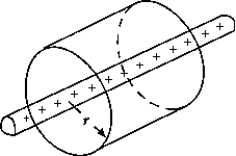 A rod of infinite length has a charge per unit length of (= q/l). Gauss's law makes it easy to determine that the electric field strength at a perpendicular distance r from the rod is, in terms of k = (4 0)-1,
A rod of infinite length has a charge per unit length of (= q/l). Gauss's law makes it easy to determine that the electric field strength at a perpendicular distance r from the rod is, in terms of k = (4 0)-1,A) k /r2
B) k /r
C) 4 k /r
D) 2k /r
E) zero

Unlock Deck
Unlock for access to all 75 flashcards in this deck.
Unlock Deck
k this deck
32
A horizontal surface of area 0.321 m2 has an electric flux of 123 N.m2/C passing through it at an angle of 25° to the horizontal. If the flux is due to a uniform electric field, calculate the magnitude of the latter.
A) 907 N.m2/C
B) 423 N.m2/C
C) 1.10 * 10-3 N.m2/C
D) 2.36 * 10-3 N.m2/C
E) 383 N.m2/C
A) 907 N.m2/C
B) 423 N.m2/C
C) 1.10 * 10-3 N.m2/C
D) 2.36 * 10-3 N.m2/C
E) 383 N.m2/C

Unlock Deck
Unlock for access to all 75 flashcards in this deck.
Unlock Deck
k this deck
33
An electric field is  = (400 N/C)
= (400 N/C)  for x > 0 and
for x > 0 and  = (-400 N/C)
= (-400 N/C)  for x < 0. A cylinder of length 30 cm and radius 10 cm has its center at the origin and its axis along the x axis such that one end is at x = +15 cm and the other is at x = -15 cm. What is the flux through the curved surface of the cylinder?
for x < 0. A cylinder of length 30 cm and radius 10 cm has its center at the origin and its axis along the x axis such that one end is at x = +15 cm and the other is at x = -15 cm. What is the flux through the curved surface of the cylinder?
A) zero
B) 1.3 kN · m2/C
C) 0.25 kN · m2/C
D) 1.3 N · m2/C
E) 0.13 MN · m2/C
 = (400 N/C)
= (400 N/C)  for x > 0 and
for x > 0 and  = (-400 N/C)
= (-400 N/C)  for x < 0. A cylinder of length 30 cm and radius 10 cm has its center at the origin and its axis along the x axis such that one end is at x = +15 cm and the other is at x = -15 cm. What is the flux through the curved surface of the cylinder?
for x < 0. A cylinder of length 30 cm and radius 10 cm has its center at the origin and its axis along the x axis such that one end is at x = +15 cm and the other is at x = -15 cm. What is the flux through the curved surface of the cylinder?A) zero
B) 1.3 kN · m2/C
C) 0.25 kN · m2/C
D) 1.3 N · m2/C
E) 0.13 MN · m2/C

Unlock Deck
Unlock for access to all 75 flashcards in this deck.
Unlock Deck
k this deck
34
A sphere of radius 8.0 cm carries a uniform volume charge density = 500 nC/m3. What is the electric field at r = 7.9 cm?
A) 16 N/C
B) 3.3 N/C
C) 60 N/C
D) 9.5 N/C
E) 1.5 kN/C
A) 16 N/C
B) 3.3 N/C
C) 60 N/C
D) 9.5 N/C
E) 1.5 kN/C

Unlock Deck
Unlock for access to all 75 flashcards in this deck.
Unlock Deck
k this deck
35
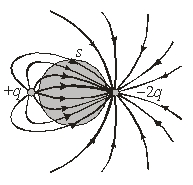 The figure shows a surface, S, with two charges q and -2q. The net flux through the surface is
The figure shows a surface, S, with two charges q and -2q. The net flux through the surface isA) q/ 0
B) -2q/ 0
C) -q/ 0
D) zero
E) None of these is correct.

Unlock Deck
Unlock for access to all 75 flashcards in this deck.
Unlock Deck
k this deck
36
A surface is so constructed that, at all points on the surface, the  vector points inward. Therefore, it can be said that
vector points inward. Therefore, it can be said that
A) the surface encloses a net positive charge.
B) the surface encloses a net negative charge.
C) the surface encloses no net charge.
D) the surface vector S at all points on the surface is necessarily parallel to the electric field vector .
.
E) the surface vector S at all points on the surface is necessarily perpendicular to the electric field vector .
.
 vector points inward. Therefore, it can be said that
vector points inward. Therefore, it can be said thatA) the surface encloses a net positive charge.
B) the surface encloses a net negative charge.
C) the surface encloses no net charge.
D) the surface vector S at all points on the surface is necessarily parallel to the electric field vector
 .
.E) the surface vector S at all points on the surface is necessarily perpendicular to the electric field vector
 .
.
Unlock Deck
Unlock for access to all 75 flashcards in this deck.
Unlock Deck
k this deck
37
A hollow metal sphere has a total charge of 100 µC. If the radius of the sphere is
50 cm, the electric field intensity at a distance of 3.0 m from the surface of the sphere is approximately
A) 3.0 *105 N/C
B) 2.6*105 N/C
C) 1.0* 105 N/C
D) 7.4 * 104 N/C
E) 3.6 * 106 N/C
50 cm, the electric field intensity at a distance of 3.0 m from the surface of the sphere is approximately
A) 3.0 *105 N/C
B) 2.6*105 N/C
C) 1.0* 105 N/C
D) 7.4 * 104 N/C
E) 3.6 * 106 N/C

Unlock Deck
Unlock for access to all 75 flashcards in this deck.
Unlock Deck
k this deck
38
An electric field is  = (400 N/C)
= (400 N/C)  for x > 0 and
for x > 0 and  = (-400 N/C)
= (-400 N/C)  for x < 0. A cylinder of length 30 cm and radius 10 cm has its center at the origin and its axis along the x axis such that one end is at x = +15 cm and the other is at x = -15 cm. What is the flux through each end of the cylinder?
for x < 0. A cylinder of length 30 cm and radius 10 cm has its center at the origin and its axis along the x axis such that one end is at x = +15 cm and the other is at x = -15 cm. What is the flux through each end of the cylinder?
A) zero
B) 1.3 kN · m2/C
C) 0.25 kN · m2/C
D) 13 N · m2/C
E) 0.13 MN · m2/C
 = (400 N/C)
= (400 N/C)  for x > 0 and
for x > 0 and  = (-400 N/C)
= (-400 N/C)  for x < 0. A cylinder of length 30 cm and radius 10 cm has its center at the origin and its axis along the x axis such that one end is at x = +15 cm and the other is at x = -15 cm. What is the flux through each end of the cylinder?
for x < 0. A cylinder of length 30 cm and radius 10 cm has its center at the origin and its axis along the x axis such that one end is at x = +15 cm and the other is at x = -15 cm. What is the flux through each end of the cylinder?A) zero
B) 1.3 kN · m2/C
C) 0.25 kN · m2/C
D) 13 N · m2/C
E) 0.13 MN · m2/C

Unlock Deck
Unlock for access to all 75 flashcards in this deck.
Unlock Deck
k this deck
39
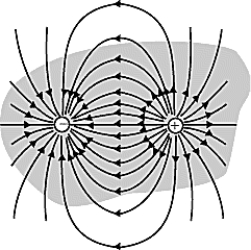 The figure shows a surface enclosing the charges q and -q. The net flux through the surface surrounding the two charges is
The figure shows a surface enclosing the charges q and -q. The net flux through the surface surrounding the two charges isA) q/ 0
B) 2q/ 0
C) -q/ 0
D) zero
E) None of these is correct.

Unlock Deck
Unlock for access to all 75 flashcards in this deck.
Unlock Deck
k this deck
40
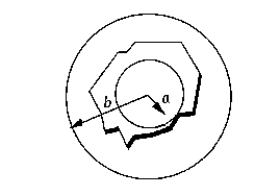 A solid sphere of radius a is concentric with a hollow sphere of radius b, where b > a. If the solid sphere has a uniform charge distribution totaling +Q and the hollow sphere a charge of -Q, the electric field at radius r, where r < a, is which of the following, in terms of k = (4 0)-1?
A solid sphere of radius a is concentric with a hollow sphere of radius b, where b > a. If the solid sphere has a uniform charge distribution totaling +Q and the hollow sphere a charge of -Q, the electric field at radius r, where r < a, is which of the following, in terms of k = (4 0)-1?A) kQ/r2
B) kQr/a3
C) kQ/a2
D) kQ/b2
E) zero

Unlock Deck
Unlock for access to all 75 flashcards in this deck.
Unlock Deck
k this deck
41
A spherical shell of radius 9.0 cm carries a uniform surface charge density
= 9.0 nC/m2. The electric field at r = 9.1 cm is approximately
A) zero
B) 1.0 kN/C
C) 0.65 kN/C
D) 0.32 kN/C
E) 0.13 kN/C
= 9.0 nC/m2. The electric field at r = 9.1 cm is approximately
A) zero
B) 1.0 kN/C
C) 0.65 kN/C
D) 0.32 kN/C
E) 0.13 kN/C

Unlock Deck
Unlock for access to all 75 flashcards in this deck.
Unlock Deck
k this deck
42
Use the figure for the next three problems. 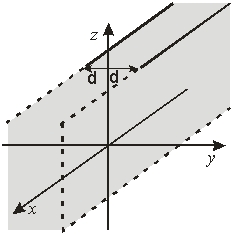 An infinite slab of thickness 2d lies in the xz-plane. The slab has a uniform volume charge density .
An infinite slab of thickness 2d lies in the xz-plane. The slab has a uniform volume charge density .
-The electric at y = b where 0 < b < d is
A) 4 k b
B) 2 k b
C) 4 k /b
D) 2 k /b
E) 4 k /b2
 An infinite slab of thickness 2d lies in the xz-plane. The slab has a uniform volume charge density .
An infinite slab of thickness 2d lies in the xz-plane. The slab has a uniform volume charge density .-The electric at y = b where 0 < b < d is
A) 4 k b
B) 2 k b
C) 4 k /b
D) 2 k /b
E) 4 k /b2

Unlock Deck
Unlock for access to all 75 flashcards in this deck.
Unlock Deck
k this deck
43
A spherical shell of radius 9.0 cm carries a uniform surface charge density
= 9.0 nC/m2. The electric field at r = 8.9 cm is approximately
A) 1.0 kN/C
B) 0.13 kN/C
C) 0.32 kN/C
D) zero
E) 0.65 kN/C
= 9.0 nC/m2. The electric field at r = 8.9 cm is approximately
A) 1.0 kN/C
B) 0.13 kN/C
C) 0.32 kN/C
D) zero
E) 0.65 kN/C

Unlock Deck
Unlock for access to all 75 flashcards in this deck.
Unlock Deck
k this deck
44
Use the figure for the next three problems.  An infinite slab of thickness 2d lies in the xz-plane. The slab has a uniform volume charge density .
An infinite slab of thickness 2d lies in the xz-plane. The slab has a uniform volume charge density .
-The electric at y = b where b > d is
A) 2 k /d
B) 4 k /d2
C) 4 k d
D) 2 k d
E) 4 k /d
 An infinite slab of thickness 2d lies in the xz-plane. The slab has a uniform volume charge density .
An infinite slab of thickness 2d lies in the xz-plane. The slab has a uniform volume charge density .-The electric at y = b where b > d is
A) 2 k /d
B) 4 k /d2
C) 4 k d
D) 2 k d
E) 4 k /d

Unlock Deck
Unlock for access to all 75 flashcards in this deck.
Unlock Deck
k this deck
45
A sphere of radius 8.0 cm carries a uniform volume charge density = 500 nC/m3. What is the electric field at r = 8.1 cm?
A) 0.12 kN/C
B) 1.5 kN/C
C) 0.74 kN/C
D) 2.3 kN/C
E) 12 kN/C
A) 0.12 kN/C
B) 1.5 kN/C
C) 0.74 kN/C
D) 2.3 kN/C
E) 12 kN/C

Unlock Deck
Unlock for access to all 75 flashcards in this deck.
Unlock Deck
k this deck
46
An infinitely long cylindrical shell of radius 6.0 cm carries a uniform surface charge density = 12 nC/m2. The electric field at r = 5.9 cm is approximately
A) 0.81 kN/C
B) zero
C) 1.3 kN/C
D) 12 kN/C
E) 0.56 kN/C
A) 0.81 kN/C
B) zero
C) 1.3 kN/C
D) 12 kN/C
E) 0.56 kN/C

Unlock Deck
Unlock for access to all 75 flashcards in this deck.
Unlock Deck
k this deck
47
An infinitely long cylinder of radius 4.0 cm carries a uniform volume charge density
= 200 nC/m3. What is the electric field at r = 3.9 cm?
A) zero
B) 0.44 kN/C
C) 57 N/C
D) 0.11 kN/C
E) 0.23 kN/C
= 200 nC/m3. What is the electric field at r = 3.9 cm?
A) zero
B) 0.44 kN/C
C) 57 N/C
D) 0.11 kN/C
E) 0.23 kN/C

Unlock Deck
Unlock for access to all 75 flashcards in this deck.
Unlock Deck
k this deck
48
A sphere of radius 8.0 cm carries a uniform volume charge density = 500 nC/m3. What is the electric field at r = 20 cm?
A) 0.24 kN/C
B) 0.12 kN/C
C) 4.8 N/C
D) 15 N/C
E) 5.4 N/C
A) 0.24 kN/C
B) 0.12 kN/C
C) 4.8 N/C
D) 15 N/C
E) 5.4 N/C

Unlock Deck
Unlock for access to all 75 flashcards in this deck.
Unlock Deck
k this deck
49
An infinitely long cylinder of radius 4.0 cm carries a uniform volume charge density
= 200 nC/m3. What is the electric field at r = 4.1 cm?
A) zero
B) 0.11 kN/C
C) 57 N/C
D) 0.44 kN/C
E) 0.23 kN/C
= 200 nC/m3. What is the electric field at r = 4.1 cm?
A) zero
B) 0.11 kN/C
C) 57 N/C
D) 0.44 kN/C
E) 0.23 kN/C

Unlock Deck
Unlock for access to all 75 flashcards in this deck.
Unlock Deck
k this deck
50
For a solid uniformly charged sphere of radius R, calculate the electric field at a distance R/2 outside the sphere, divided by the electric field at a distance R/2 inside the sphere.
A) 9/8
B) infinity
C) 2.0
D) 8.0
E) 8/9
A) 9/8
B) infinity
C) 2.0
D) 8.0
E) 8/9

Unlock Deck
Unlock for access to all 75 flashcards in this deck.
Unlock Deck
k this deck
51
An infinitely long cylindrical shell of radius 6.0 cm carries a uniform surface charge density = 12 nC/m2. The electric field at r = 10 cm is approximately
A) 12 kN/C
B) 0.56 kN/C
C) 1.3 kN/C
D) 0.81 kN/C
E) zero
A) 12 kN/C
B) 0.56 kN/C
C) 1.3 kN/C
D) 0.81 kN/C
E) zero

Unlock Deck
Unlock for access to all 75 flashcards in this deck.
Unlock Deck
k this deck
52
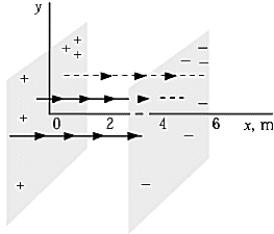 An infinite plane of surface charge density = +8.00 nC/m2 lies in the yz plane at the origin, and a second infinite plane of surface charge density = -8.00 nC/m2 lies in a plane parallel to the yz plane at x = 4.00 m. The electric field at x = 5.00 m is approximately
An infinite plane of surface charge density = +8.00 nC/m2 lies in the yz plane at the origin, and a second infinite plane of surface charge density = -8.00 nC/m2 lies in a plane parallel to the yz plane at x = 4.00 m. The electric field at x = 5.00 m is approximatelyA) 226 N/C
B) 339 N/C
C) 904 N/C
D) 452 N/C
E) zero

Unlock Deck
Unlock for access to all 75 flashcards in this deck.
Unlock Deck
k this deck
53
An infinitely long cylinder of radius 4.0 cm carries a uniform volume charge density
= 200 nC/m3. What is the electric field at r = 2.0 cm?
A) zero
B) 0.11 kN/C
C) 57 N/C
D) 0.44 kN/C
E) 0.23 kN/C
= 200 nC/m3. What is the electric field at r = 2.0 cm?
A) zero
B) 0.11 kN/C
C) 57 N/C
D) 0.44 kN/C
E) 0.23 kN/C

Unlock Deck
Unlock for access to all 75 flashcards in this deck.
Unlock Deck
k this deck
54
An infinitely long cylindrical shell of radius 6.0 cm carries a uniform surface charge density = 12 nC/m2. The electric field at r = 6.1 cm is approximately
A) 0.81 kN/C
B) zero
C) 1.3 kN/C
D) 12 kN/C
E) 0.56 kN/C
A) 0.81 kN/C
B) zero
C) 1.3 kN/C
D) 12 kN/C
E) 0.56 kN/C

Unlock Deck
Unlock for access to all 75 flashcards in this deck.
Unlock Deck
k this deck
55
An infinitely long cylinder of radius 4.0 cm carries a uniform volume charge density
= 200 nC/m3. What is the electric field at r = 8.0 cm?
A) 0.23 kN/C
B) 0.11 kN/C
C) 57 N/C
D) 0.44 kN/C
E) zero
= 200 nC/m3. What is the electric field at r = 8.0 cm?
A) 0.23 kN/C
B) 0.11 kN/C
C) 57 N/C
D) 0.44 kN/C
E) zero

Unlock Deck
Unlock for access to all 75 flashcards in this deck.
Unlock Deck
k this deck
56
A spherical shell of radius 9.0 cm carries a uniform surface charge density
= 9.0 nC/m2. The electric field at r = 4.0 cm is approximately
A) 0.13 kN/C
B) 1.0 kN/C
C) 0.32 kN/C
D) 0.75 kN/C
E) zero
= 9.0 nC/m2. The electric field at r = 4.0 cm is approximately
A) 0.13 kN/C
B) 1.0 kN/C
C) 0.32 kN/C
D) 0.75 kN/C
E) zero

Unlock Deck
Unlock for access to all 75 flashcards in this deck.
Unlock Deck
k this deck
57
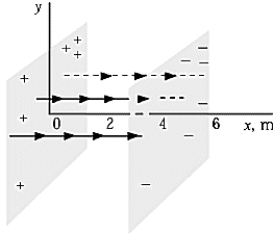 An infinite plane of surface charge density = +8.00 nC/m2 lies in the yz plane at the origin, and a second infinite plane of surface charge density = -8.00 nC/m2 lies in a plane parallel to the yz plane at x = 4.00 m. The electric field at x = 3.50 m is approximately
An infinite plane of surface charge density = +8.00 nC/m2 lies in the yz plane at the origin, and a second infinite plane of surface charge density = -8.00 nC/m2 lies in a plane parallel to the yz plane at x = 4.00 m. The electric field at x = 3.50 m is approximatelyA) 226 N/C
B) 339 N/C
C) 904 N/C
D) 452 N/C
E) zero

Unlock Deck
Unlock for access to all 75 flashcards in this deck.
Unlock Deck
k this deck
58
A spherical shell of radius 9.0 cm carries a uniform surface charge density
= 9.0 nC/m2. The electric field at r = 16 cm is approximately
A) 0.32 kN/C
B) 1.0 kN/C
C) zero
D) 0.13 kN/C
E) 0.53 kN/C
= 9.0 nC/m2. The electric field at r = 16 cm is approximately
A) 0.32 kN/C
B) 1.0 kN/C
C) zero
D) 0.13 kN/C
E) 0.53 kN/C

Unlock Deck
Unlock for access to all 75 flashcards in this deck.
Unlock Deck
k this deck
59
An infinitely long cylindrical shell of radius 6.0 cm carries a uniform surface charge density = 12 nC/m2. The electric field at r = 2.0 cm is approximately
A) 12 kN/C
B) 0.56 kN/C
C) 1.3 kN/C
D) 0.81 kN/C
E) zero
A) 12 kN/C
B) 0.56 kN/C
C) 1.3 kN/C
D) 0.81 kN/C
E) zero

Unlock Deck
Unlock for access to all 75 flashcards in this deck.
Unlock Deck
k this deck
60
Which diagram best represents the electric field along the y-axis? 
A) 1
B) 2
C) 3
D) 4
E) none of the diagrams

A) 1
B) 2
C) 3
D) 4
E) none of the diagrams

Unlock Deck
Unlock for access to all 75 flashcards in this deck.
Unlock Deck
k this deck
61
Use the following scenario for the next question. 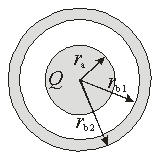 A solid conducting sphere of radius ra is placed concentrically inside a conducting spherical shell of inner radius rb1 and outer radius rb2. The inner sphere carries a charge Q while the outer sphere does not carry any net charge.
A solid conducting sphere of radius ra is placed concentrically inside a conducting spherical shell of inner radius rb1 and outer radius rb2. The inner sphere carries a charge Q while the outer sphere does not carry any net charge.
-The electric field for rb1 r rb2 is
A) -kQ/r2
B) kQ/r2
C) -2kQ/r
D) 2kQ/r
E) zero
 A solid conducting sphere of radius ra is placed concentrically inside a conducting spherical shell of inner radius rb1 and outer radius rb2. The inner sphere carries a charge Q while the outer sphere does not carry any net charge.
A solid conducting sphere of radius ra is placed concentrically inside a conducting spherical shell of inner radius rb1 and outer radius rb2. The inner sphere carries a charge Q while the outer sphere does not carry any net charge.-The electric field for rb1 r rb2 is
A) -kQ/r2
B) kQ/r2
C) -2kQ/r
D) 2kQ/r
E) zero

Unlock Deck
Unlock for access to all 75 flashcards in this deck.
Unlock Deck
k this deck
62
Use the following scenario for the next question.  A solid conducting sphere of radius ra is placed concentrically inside a conducting spherical shell of inner radius rb1 and outer radius rb2. The inner sphere carries a charge Q while the outer sphere does not carry any net charge.
A solid conducting sphere of radius ra is placed concentrically inside a conducting spherical shell of inner radius rb1 and outer radius rb2. The inner sphere carries a charge Q while the outer sphere does not carry any net charge.
-The electric field for r rb1 is
A) -kQ/r2
B) kQ/r2
C) -2kQ/r
D) 2kQ/r
E) zero
 A solid conducting sphere of radius ra is placed concentrically inside a conducting spherical shell of inner radius rb1 and outer radius rb2. The inner sphere carries a charge Q while the outer sphere does not carry any net charge.
A solid conducting sphere of radius ra is placed concentrically inside a conducting spherical shell of inner radius rb1 and outer radius rb2. The inner sphere carries a charge Q while the outer sphere does not carry any net charge.-The electric field for r rb1 is
A) -kQ/r2
B) kQ/r2
C) -2kQ/r
D) 2kQ/r
E) zero

Unlock Deck
Unlock for access to all 75 flashcards in this deck.
Unlock Deck
k this deck
63
The electric field at the surface of a conductor
A) is parallel to the surface.
B) depends only on the total charge on the conductor.
C) depends only on the area of the conductor.
D) depends only on the curvature of the surface.
E) depends on the area and curvature of the conductor and on its charge.
A) is parallel to the surface.
B) depends only on the total charge on the conductor.
C) depends only on the area of the conductor.
D) depends only on the curvature of the surface.
E) depends on the area and curvature of the conductor and on its charge.

Unlock Deck
Unlock for access to all 75 flashcards in this deck.
Unlock Deck
k this deck
64
Electrical conductors contain
A) only free electrons.
B) only bound electrons.
C) both free and bound electrons.
D) neither bound nor free electrons.
E) only protons and neutrons.
A) only free electrons.
B) only bound electrons.
C) both free and bound electrons.
D) neither bound nor free electrons.
E) only protons and neutrons.

Unlock Deck
Unlock for access to all 75 flashcards in this deck.
Unlock Deck
k this deck
65
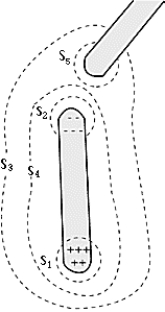 The charge on an originally uncharged insulated conductor is separated by induction from a positively charged rod brought near the conductor. For which of the various Gaussian surfaces represented by the dashed lines does
The charge on an originally uncharged insulated conductor is separated by induction from a positively charged rod brought near the conductor. For which of the various Gaussian surfaces represented by the dashed lines does  = 0?
= 0?A) S1
B) S2
C) S3
D) S4
E) S5

Unlock Deck
Unlock for access to all 75 flashcards in this deck.
Unlock Deck
k this deck
66
A non-conducting pipe has a uniform charge density of 50 C/m3. The inner radius of the pipe is 25 cm, while the outer radius is 35 cm. Calculate the magnitude of the electric field at r = 40 cm.
A) 6.8 * 1011 N/C
B) 8.5 * 1011 N/C
C) 4.2 * 1011 N/C
D) 1.3* 1011 N/C
E) 8.7 * 1010 N/C
A) 6.8 * 1011 N/C
B) 8.5 * 1011 N/C
C) 4.2 * 1011 N/C
D) 1.3* 1011 N/C
E) 8.7 * 1010 N/C

Unlock Deck
Unlock for access to all 75 flashcards in this deck.
Unlock Deck
k this deck
67
The electric field for a spherical shell of charge is discontinuous by the amount _____ at a point where there is a surface charge density .
A) 0/
B) / 0
C) 0/ 2
D) 02/ 2
E) 2/ 0
A) 0/
B) / 0
C) 0/ 2
D) 02/ 2
E) 2/ 0

Unlock Deck
Unlock for access to all 75 flashcards in this deck.
Unlock Deck
k this deck
68
A non-conducting pipe has a uniform charge density of 50 C/m3. The inner radius of the pipe is 25 cm, while the outer radius is 35 cm. Calculate the magnitude of the electric field at r = 30 cm.
A) 5.2 *109 N/C
B) 2.6 * 1011 N/C
C) 8.2 * 1010 N/C
D) 4.7 * 1011 N/C
E) 4.9*1010 N/C
A) 5.2 *109 N/C
B) 2.6 * 1011 N/C
C) 8.2 * 1010 N/C
D) 4.7 * 1011 N/C
E) 4.9*1010 N/C

Unlock Deck
Unlock for access to all 75 flashcards in this deck.
Unlock Deck
k this deck
69
The electric field for an infinite plane of charge is discontinuous by the amount _____ at a point where there is a surface charge density .
A) 0/
B) / 0
C) 0/ 2
D) 02/ 2
E) 2/ 0
A) 0/
B) / 0
C) 0/ 2
D) 02/ 2
E) 2/ 0

Unlock Deck
Unlock for access to all 75 flashcards in this deck.
Unlock Deck
k this deck
70
A large, flat conducting plate has a surface charge density = 8.0 * 10-9 C/m2 on one of its surfaces. What is the magnitude of the electric field 10 µm from this plate?
A) 72 N/C
B) 0.23 kN/C
C) 0.90 kN/C
D) 90 MN/C
E) 9.0 * 1012 N/C
A) 72 N/C
B) 0.23 kN/C
C) 0.90 kN/C
D) 90 MN/C
E) 9.0 * 1012 N/C

Unlock Deck
Unlock for access to all 75 flashcards in this deck.
Unlock Deck
k this deck
71
For a uniformly charged spherical sphere of radius R carrying a total charge Q, calculate the electric field at a distance R/2 outside the sphere divided by the electric field at a distance R/2 inside the sphere.
A) 9/8
B) infinity
C) 4/9
D) 8.0
E) 8/9
A) 9/8
B) infinity
C) 4/9
D) 8.0
E) 8/9

Unlock Deck
Unlock for access to all 75 flashcards in this deck.
Unlock Deck
k this deck
72
Use the following scenario for the next question.  A solid conducting sphere of radius ra is placed concentrically inside a conducting spherical shell of inner radius rb1 and outer radius rb2. The inner sphere carries a charge Q while the outer sphere does not carry any net charge.
A solid conducting sphere of radius ra is placed concentrically inside a conducting spherical shell of inner radius rb1 and outer radius rb2. The inner sphere carries a charge Q while the outer sphere does not carry any net charge.
-The electric field for ra r rb1 is
A) -kQ/r2
B) kQ/r2
C) F-2kQ/r
D) 2kQ/r
E) zero
 A solid conducting sphere of radius ra is placed concentrically inside a conducting spherical shell of inner radius rb1 and outer radius rb2. The inner sphere carries a charge Q while the outer sphere does not carry any net charge.
A solid conducting sphere of radius ra is placed concentrically inside a conducting spherical shell of inner radius rb1 and outer radius rb2. The inner sphere carries a charge Q while the outer sphere does not carry any net charge.-The electric field for ra r rb1 is
A) -kQ/r2
B) kQ/r2
C) F-2kQ/r
D) 2kQ/r
E) zero

Unlock Deck
Unlock for access to all 75 flashcards in this deck.
Unlock Deck
k this deck
73
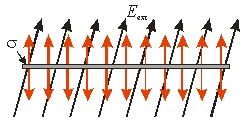 A thin conducting plane with surface charge density is exposed to an external electric Eext. The difference in the electric field between one surface of the plane to the other surface is
A thin conducting plane with surface charge density is exposed to an external electric Eext. The difference in the electric field between one surface of the plane to the other surface isA) / 0
B) / 0 + Eext
C) / 0 + Eext.
D) 2 / 0 + Eext
E) /2 0 +Eext.

Unlock Deck
Unlock for access to all 75 flashcards in this deck.
Unlock Deck
k this deck
74
The surface charge density for r = rb1 is
A) Q/( rb12)
B) - Q/( rb12)
C) Q/(4 rb12)
D)-Q/(4 rb12)
E) zero
A) Q/( rb12)
B) - Q/( rb12)
C) Q/(4 rb12)
D)-Q/(4 rb12)
E) zero

Unlock Deck
Unlock for access to all 75 flashcards in this deck.
Unlock Deck
k this deck
75
A solid spherical conductor has a radius of 15 cm. The electric field 30 cm from the center of this sphere has a magnitude of 800 N/C. What is the surface charge density on the sphere?
A) 7.1* 10-9 C/m2
B) 1.0 *10-8 C/m2
C) 1.4 * 10-8 C/m2
D) 2.8 *10-8 C/m2
E) 1.1 * 10-7 C/m2
A) 7.1* 10-9 C/m2
B) 1.0 *10-8 C/m2
C) 1.4 * 10-8 C/m2
D) 2.8 *10-8 C/m2
E) 1.1 * 10-7 C/m2

Unlock Deck
Unlock for access to all 75 flashcards in this deck.
Unlock Deck
k this deck


